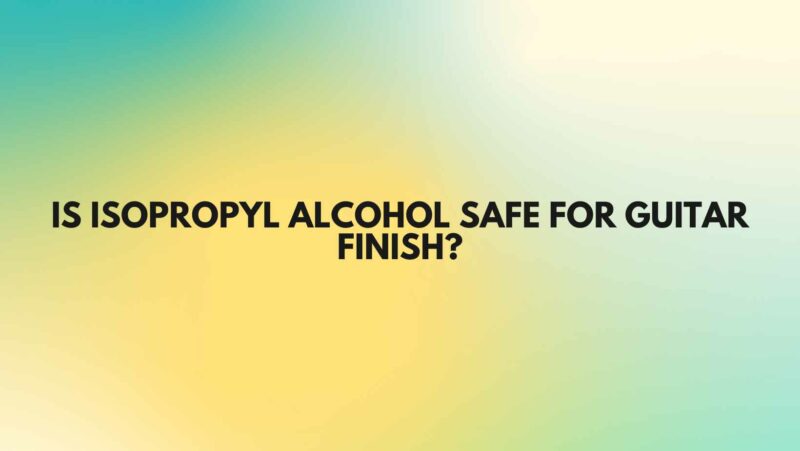Maintaining the beauty and integrity of your guitar’s finish is crucial for preserving its value and appearance. While isopropyl alcohol is a commonly used cleaning agent, there is uncertainty among guitarists about whether it is safe for use on guitar finishes. In this comprehensive guide, we will explore the potential effects of isopropyl alcohol on guitar finishes, its safe applications, and alternative methods for guitar cleaning and maintenance.
Understanding Isopropyl Alcohol
Isopropyl alcohol, also known as rubbing alcohol, is a clear, colorless liquid with a strong odor. It is commonly used as a disinfectant, antiseptic, and cleaning agent due to its ability to dissolve oils and evaporate quickly without leaving residue. Isopropyl alcohol is available in various concentrations, with higher percentages being more potent and effective for cleaning.
Is Isopropyl Alcohol Safe for Guitar Finish?
Using isopropyl alcohol on a guitar finish is a topic that generates much debate among guitarists and luthiers. The safety of isopropyl alcohol for guitar finishes depends on various factors, including the finish type and concentration of the alcohol.
Effects of Isopropyl Alcohol on Guitar Finishes:
- Nitrocellulose Lacquer Finish: Nitrocellulose lacquer is a traditional and delicate finish commonly found on vintage and high-end guitars. Isopropyl alcohol can potentially soften or dissolve nitrocellulose lacquer, leading to damage or cloudiness on the finish. It should be avoided on nitrocellulose finishes.
- Polyurethane and Polyester Finishes: Modern guitars often feature polyurethane or polyester finishes, which are more durable and resistant to chemicals. Isopropyl alcohol is generally considered safe for use on these finishes when used sparingly and with care.
- Matte and Satin Finishes: Isopropyl alcohol can affect the texture and appearance of matte and satin finishes, potentially making them glossy or altering the sheen. It should be used cautiously on these finishes.
- Spot Testing: Before using isopropyl alcohol on your guitar’s finish, it is advisable to perform a spot test in an inconspicuous area to assess any potential adverse reactions.
Safe Applications of Isopropyl Alcohol for Guitar Maintenance:
While isopropyl alcohol should be used sparingly and with caution on guitars with certain finishes, it can be applied safely in some situations:
- Hardware and Metal Parts: Isopropyl alcohol can effectively clean metal hardware, such as bridge saddles, tuning machines, and pickup covers, without affecting the guitar’s finish. Be sure to apply it only to the metal parts, avoiding contact with the finish.
- Fretboard Cleaning: When cleaning a guitar’s fretboard, you can use isopropyl alcohol sparingly on the frets and fretboard. However, avoid contact with the finish, as it can damage certain types of finishes.
Alternative Methods for Guitar Cleaning and Maintenance
If you want to clean your guitar without the potential risks associated with isopropyl alcohol, consider these alternative methods:
- Dedicated Guitar Cleaning Products: There are numerous guitar cleaning products available on the market, including polishes, cleaners, and fretboard conditioners. These products are specifically formulated for use on guitars and are safe for various finish types.
- Microfiber Cloth: A clean, dry microfiber cloth is an excellent tool for removing dust, fingerprints, and smudges from your guitar’s finish. It can be used for regular maintenance.
- Fretboard Oils: For cleaning and conditioning the fretboard, use specialized fretboard oils or lemon oil. These products are designed to moisturize the wood without harming the finish.
- String Changes: Regularly changing your strings can have a significant impact on your guitar’s overall cleanliness and appearance. New strings tend to be brighter and less prone to collecting dirt and debris.
- Humidity Control: Using a humidifier or dehumidifier in your guitar’s case can help maintain stable humidity levels, which is essential for preserving the health of both the guitar and its finish.
Conclusion
In conclusion, the use of isopropyl alcohol on guitar finishes depends on the type of finish and should be approached with caution. While it can be safely used on certain finishes, it can potentially harm or alter others. It is crucial to understand the type of finish on your guitar and perform spot tests if necessary. However, for most guitar cleaning and maintenance needs, there are specialized guitar cleaning products and alternative methods that offer safer and more effective solutions for preserving the beauty and longevity of your instrument’s finish. Ultimately, the choice of cleaning method should align with the specific needs of your guitar’s finish and construction.

